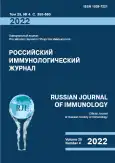Phenotypic features of innate lymphoid cells in rheumatoid arthritis
- Authors: Boeva O.S.1,2, Berishvili M.T.1,3, Sizikov A.E.1, Pashkina E.A.1
-
Affiliations:
- Research Institute of Fundamental and Clinical Immunology
- Novosibirsk National Research State University
- Novosibirsk State Medical University
- Issue: Vol 25, No 4 (2022)
- Pages: 393-398
- Section: SHORT COMMUNICATIONS
- URL: https://journal-vniispk.ru/1028-7221/article/view/120054
- DOI: https://doi.org/10.46235/1028-7221-1184-PFO
- ID: 120054
Cite item
Full Text
Abstract
Currently, rheumatoid arthritis (RA) is considered among the most common autoimmune diseases worldwide, being associated with progressing disability, systemic organ and tissue lesions, as well as social and economic losses for the state. Studies of innate lymphoid cells (ILS) seems to be actual and significant when studying development of autoimmune inflammation in RA, in particular, the issues of the cell plasticity. ILC represent tissue resident lymphoid cells that display functional diversity, like as T cells. Moreover, ILC regulate orientation of immune response by means of cytokine production. Small amounts of ILCs are present in the bloodstream, presumably for migration to target organs and tissues. Accordingly, the study of ILC in RA will promote understanding of the RA pathogenesis. It is also possible in the future to develop new therapeutic strategies based on the impact on the immunological balance, as well as reducing the inflammatory process in RA. The aim of this study was to determine the subpopulation composition and phenotypic features of ILCs in RA.
We have isolated and studied peripheral blood mononuclear cells (PBMC) from 7 patients with RA and 6 healthy donors. The isolated blood MNCs were stained with monoclonal antibodies conjugated to fluorochromes: lineage-specific (CD3/14/16/19/20/56) and anti-FceR1 alpha-FITC, anti-CD294-APC/Cy7, anti-CD127-PerCP/Cy5.5, anti-CD336-PE, anti-CD117-APC. ILCs were defined as Lin-CD127+. The numbers of CD294+ILCs (ILC2) were estimated in the general population, CD117-CD294-ILCs were defined as ILC1, and CD117+CD294-ILCs, as ILC3. The cell phenotype was analyzed with a FACS Canto II flow cytometer (BD Biosciences, USA).
We determined relative numbers of different ILC subpopulations (ILC1, ILC2, and ILC3) among the total blood MNCs. It was shown, that the number of ILC2 cells in RA patients was statistically significantly reduced compared to healthy donors, whereas no significant differences in percentage of ILC1 and ILC3 were revealed between donors and patients. We also evaluated the amount of c-Kit+ILC2; there were no significant differences in the proportion of these cells between donors and patients.
ILCs represent a population of cells that contribute to the RA pathogenesis. The role of ILC2 in RA is, presumably, protective. The ILC imbalance may contribute to the development of RA. For a better understanding of the RA pathogenesis, further studies of the subpopulation profile, phenotypic and functional characteristics of ILC are required in this disorder.
Full Text
##article.viewOnOriginalSite##About the authors
O. S. Boeva
Research Institute of Fundamental and Clinical Immunology; Novosibirsk National Research State University
Author for correspondence.
Email: starchenkova97@gmail.com
Researcher Laboratory Assistant, Laboratory of Clinical Immunopathology; Student
Russian Federation, Novosibirsk; NovosibirskM. T. Berishvili
Research Institute of Fundamental and Clinical Immunology; Novosibirsk State Medical University
Email: starchenkova97@gmail.com
Researcher Laboratory Assistant, Laboratory of Clinical Immunopathology; Student
Russian Federation, Novosibirsk; NovosibirskA. E. Sizikov
Research Institute of Fundamental and Clinical Immunology
Email: starchenkova97@gmail.com
PhD (Medicine), Head, Department of Rheumatology, Acting Chief Physician of the Immunopathology Clinic
Russian Federation, NovosibirskE. A. Pashkina
Research Institute of Fundamental and Clinical Immunology
Email: starchenkova97@gmail.com
PhD (Biology), Senior Research Associate, Laboratory of Clinical Immunopathology
Russian Federation, NovosibirskReferences
- Edilova M.I., Akram A., Abdul-Sater A.A. Innate immunity drives pathogenesis of rheumatoid arthritis. Biomed. J., 2021, Vol. 44, no. 2, pp. 172-182.
- Hochdörfer T., Winkler C., Pardali K., Mjösberg J. Expression of c-Kit discriminates between two functionally distinct subsets of human type 2 innate lymphoid cells. Eur. J. Immunol., 2019, Vol. 49, no. 6, pp. 884-893.
- Leijten E.F., van Kempen T.S., Boes M., Michels-van Amelsfort J.M., Hijnen D., Hartgring S.A., van Roon J.A., Wenink M.H., Radstake T.R. Brief report: enrichment of activated group 3 innate lymphoid cells in psoriatic arthritis synovial fluid. Arthritis Rheumatol., 2015, Vol. 67, no. 10, pp. 2673-2678.
- Marsal S., Julià A. Rheumatoid arthritis pharmacogenomics. Pharmacogenomics, 2010, Vol. 11, no. 5, pp. 617-619.
- McInnes I.B., Schett G. The pathogenesis of rheumatoid arthritis. N. Engl. J. Med., 2011, Vol. 365, no. 23, pp. 2205-2219.
- Omata Y., Frech M., Primbs T., Lucas S., Andreev D., Scholtysek C., Sarter K., Kindermann M., Yeremenko N., Baeten D.L., Andreas N., Kamradt T., Bozec A., Ramming A., Krönke G., Wirtz S., Schett G., Zaiss M.M. Group 2innate lymphoid cells attenuate inflammatory arthritis and protect from bone destruction in mice. Cell Rep., 2018, Vol. 24, pp. 169-180.
- Smolen J.S., Aletaha D., Bijlsma J.W., Breedveld F.C., Boumpas D., Burmester G., Combe B., Cutolo M., de Wit M., Dougados M., Emery P., Gibofsky A., Gomez-Reino J.J., Haraoui B., Kalden J., Keystone E.C., Kvien T.K., McInnes I., Martin-Mola E., Montecucco C., Schoels M., van der Heijde D.; T2T Expert Committee. Treating rheumatoid arthritis to target: recommendations of an international task force. Ann. Rheum. Dis., 2010, Vol. 69, no. 4, pp. 631-637.
- Wu X. Innate lymphocytes in inflammatory arthritis. Front. Immunol., 2020, Vol. 11, 565275. doi: 10.3389/fimmu.2020.565275.
- Yang F., Luo X., Zhu W., Li J., Zheng Z., Zhu P. Dysregulation of innate lymphoid cells in patients with active rheumatoid arthritis and mice with collagen-induced arthritis. Mediators Inflamm., 2021, Vol. 2021, 1915068. doi: 10.1155/2021/1915068.









